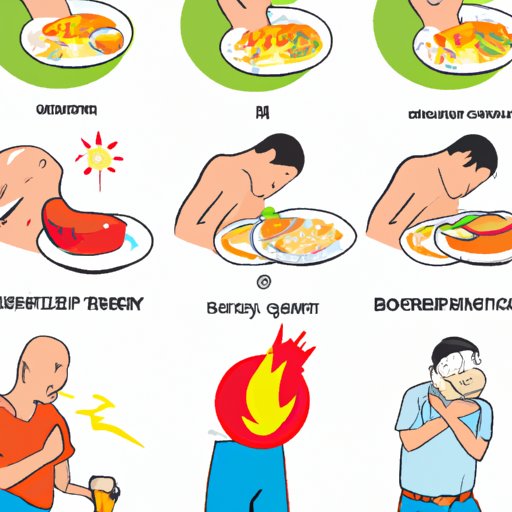Introduction
Heartburn is a common problem that causes a burning sensation in the chest or throat. It occurs when stomach acid flows up into the esophagus, usually due to a weakened or malfunctioning lower esophageal sphincter (LES). While there are many treatments available for heartburn, it’s also important to learn how to prevent it in the first place. In this article, we’ll explore some tips and strategies for preventing heartburn after eating.
Avoid Eating Large Meals
Eating large meals can put extra pressure on the LES, causing it to open and allow stomach acid to flow back up into the esophagus. To reduce the risk of heartburn, try to avoid eating large meals. Instead, opt for smaller meals throughout the day.
When eating smaller meals, be sure to take your time and chew your food thoroughly before swallowing. This will help your stomach digest the food more easily, reducing the risk of heartburn.

Eat Slowly and Chew Food Thoroughly
Eating slowly gives your stomach time to process the food and helps prevent overeating. Taking your time also allows your brain to register when you’re full, which can help you avoid indigestion and heartburn.
In addition to eating slowly, make sure to chew your food thoroughly before swallowing. This breaks down the food into smaller pieces, making it easier for your stomach to digest.
Avoid Trigger Foods
Certain foods can increase the risk of heartburn. Common trigger foods include spicy foods, fatty foods, citrus fruits, tomatoes, chocolate, garlic, onions, caffeine, and alcohol. If you notice that certain foods leave you feeling uncomfortable after eating, try to avoid them as much as possible.
It can also help to keep a food diary to identify any potential triggers. Write down what you eat and how you feel afterward. This can help you pinpoint any foods that may be causing your heartburn.
Don’t Lie Down After Eating
Lying down after eating can put extra pressure on the LES, causing it to open and allow stomach acid to flow back up into the esophagus. To reduce the risk of heartburn, try to stay upright for at least two hours after eating.
If you need to lie down after eating, prop yourself up with pillows or use an adjustable bed frame to elevate your head. This will keep your body in an upright position and reduce the risk of heartburn.
Stay Upright During and After Eating
Staying upright during and after eating can help keep stomach acid down in the stomach where it belongs. Try to remain sitting or standing up while eating and for at least two hours after. This will give your stomach time to digest the food before lying down.
If you have to eat while lying down, consider using a wedge pillow to support your upper body. This will keep your torso elevated, helping to reduce the risk of heartburn.

Elevate Your Head While Sleeping
When lying flat, stomach acid can more easily flow back up into the esophagus, leading to heartburn. To reduce the risk of heartburn while sleeping, prop yourself up with pillows or use an adjustable bed frame to elevate your head. This will keep your body in an upright position, making it harder for stomach acid to flow back up into the esophagus.
Alternatively, you can use a wedge pillow to keep your torso elevated while you sleep. This will help keep stomach acid down in the stomach where it belongs.
Conclusion
Heartburn is a common problem caused by the regurgitation of stomach acid. To reduce the risk of heartburn, try to avoid eating large meals, eat slowly and chew your food thoroughly, avoid trigger foods, don’t lie down after eating, and stay upright during and after eating. Additionally, try to elevate your head while sleeping to reduce the risk of heartburn.
By following these tips and strategies, you can help prevent heartburn from occurring in the first place. For more information on heartburn and its treatment, talk to your doctor.
(Note: Is this article not meeting your expectations? Do you have knowledge or insights to share? Unlock new opportunities and expand your reach by joining our authors team. Click Registration to join us and share your expertise with our readers.)
